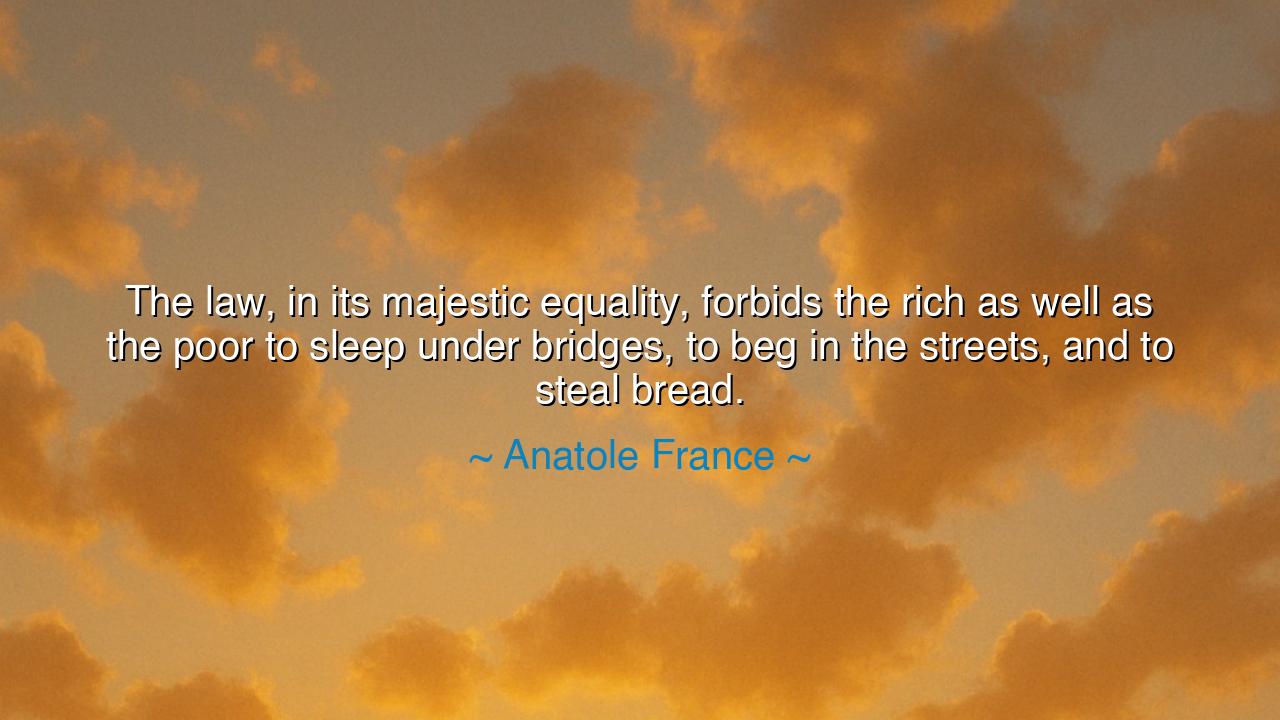
The law, in its majestic equality, forbids the rich as well as
The law, in its majestic equality, forbids the rich as well as the poor to sleep under bridges, to beg in the streets, and to steal bread.






“The law, in its majestic equality, forbids the rich as well as the poor to sleep under bridges, to beg in the streets, and to steal bread.” These words of Anatole France, the French novelist and Nobel laureate, pierce through the illusion of justice with the blade of irony. They are not merely a witticism, but a profound indictment of a society that mistakes uniformity for fairness. Beneath his calm satire lies the sorrow of one who has seen how laws, though written in equal terms, are lived in unequal worlds. His quote reminds us that equality of words is not equality of reality — and that justice, without compassion and context, can become the coldest cruelty of all.
Anatole France wrote these words in the late 19th century, an age when Europe was shining with progress and shadowed by poverty. It was a time when the ruling classes declared the law to be blind — blind to wealth, blind to birth, blind to station — and therefore just. But France, who walked the streets of Paris and saw the hunger of the poor, understood that such blindness was not virtue but denial. The law, in its so-called majesty, punished the hungry man for stealing bread and the homeless for sleeping in public — yet these were not crimes born of greed or malice, but of necessity. The rich, too, were forbidden to steal or beg, but they never needed to; their comfort protected them from the crimes of desperation. Thus, the law, while appearing equal, served the powerful and crushed the powerless.
To the ancients, justice was not blind but balanced. The goddess Themis, who held the scales, was not indifferent to suffering — she weighed circumstance and consequence alike. But modern societies, as Anatole France observed, replaced her living balance with a lifeless abstraction: law without heart. A statute written in neutral ink may seem fair, yet its weight falls differently upon different shoulders. The man with a full belly does not feel the same law as the one whose child cries for food. France saw that this false equality was more dangerous than open tyranny, for it clothed injustice in the robes of morality.
Consider the story of Jean Valjean, from Victor Hugo’s Les Misérables, written just decades before Anatole France’s time. Valjean was imprisoned for nineteen years — not for treason, nor violence, but for stealing a loaf of bread to feed his sister’s starving family. The law, majestic and impartial, treated him as a criminal equal to any other. Yet what equality is there between hunger and greed? Between survival and vice? The judge applied the law without hatred, but also without mercy. In that moment, the majesty of law revealed itself as a mask — one that hid the indifference of society to the suffering it had created.
France’s irony is not the bitterness of mockery, but the sorrow of clarity. He exposes a truth that nations still struggle to accept: that justice without compassion is hypocrisy, and that equality in word is hollow without equality in condition. The laws that punish the poor for their misery are written by those who have never known it. When the law forbids both rich and poor to sleep under bridges, it forgets that the rich already have roofs. When it forbids them both to beg, it forgets that one has servants and the other, nothing. In the eyes of bureaucracy, all are equal; in the eyes of humanity, this is blindness masquerading as order.
And yet, from this irony arises a call to conscience. France’s words do not reject law, but demand its redemption — they call for justice that sees not only acts, but needs; not only rules, but reasons. The law must not stand above humanity, but serve it. A society that values the letter over the spirit of justice will one day find itself bound by its own indifference. To build a fair world, we must write laws that lift, not laws that punish the fallen for falling.
So let this truth be passed down as wisdom: equality is not sameness, and justice is not indifference. The righteous lawgiver must look with both eyes — one of reason, the other of mercy. When you see a man sleeping under a bridge, do not praise the law that forbids it; ask instead why the bridge has become his shelter. When you see a woman begging, do not glory in her freedom to obey the same rules as the rich; ask why those rules have left her empty-handed. Remember always that justice without compassion is tyranny in disguise. Only when the law serves the least among us does it truly honor its own majesty — for then, and only then, is equality not a mask of pride, but the face of love.






AAdministratorAdministrator
Welcome, honored guests. Please leave a comment, we will respond soon